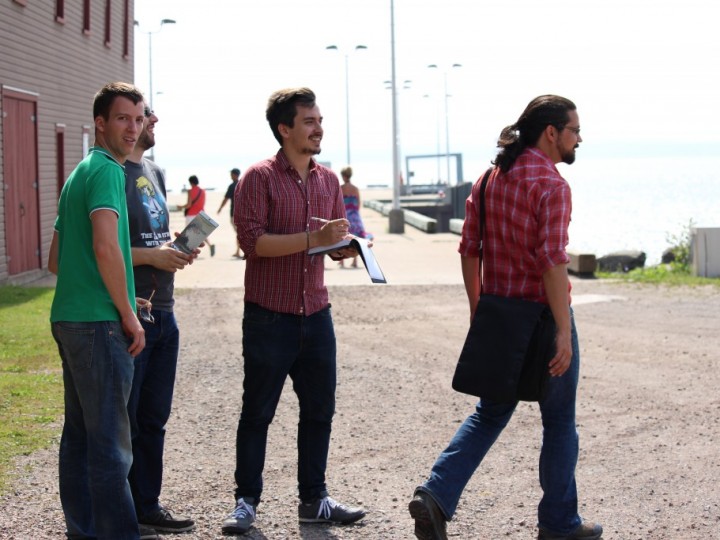
Affordance at Serious Play Conference 2016
Our CEO, Pascal Nataf, and our creative director, Kim Berthiaume, travelled all the way to Raleigh, North Carolina last week to attend the 6th edition of the Serious Play Conference (SPC). Maybe in the near future we won’t have to travel as far and we can have the 2017 or 2018 SPC in Montreal? Who knows?
First of all, we’d like to give a very special thanks to Sue Bohle, Executive Director, for organizing this great event which provides an opportunity for game developers, client partners and academics to share their experiences in the amazing field of serious games. It was hard to beat last year’s event in Pittsburgh where the cocktail finale was held at Schell Games! Let’s see what our ambassadors saw for the 2016 edition of SPC!
Raleigh is not only steps away from Myrtle Beach (where we definitely had some fun and sun!), but it is also the headquarters of Hazardous Software. The Hazardous team is brimming with imagination. They developed a cyber safety game called Cyber Threat Defender as well as a real-time strategy game named Achron where you can travel back in time. Definitely check them out!
We went to a lot of amazing conferences during our three conference days (July 26-28th). So here is our top 5!
5 – Ira Sockwitz, Learning Game Studio
Ira Sockowitz, CEO and co-founder of Learning Game Studios, came to speak about the state of adult education. According to him, most educational resources go into the formal education system which leaves little money for adult and immigrant education programs. So Ira Sockwitz founded his company to address this specific gap. He firmly believes that games facilitate the acquisition of knowledge and the development of skills that can help adults, immigrants and employees find jobs and improve their lives.
For example, Ira’s Learning Game Studios developed an ESL game called Xenos. The Xenos universe is a choose-your-own-adventure story. In it, learners are encouraged to socialize together at the port, in markets and in public places, but only in English.
4 – Jesse Schell, Schell Games
As always, Jesse Schell packed the house. This year, Jesse talked about virtual reality, which seems to be the topic of choice for almost every game development conference we have attended this year. In his talk, Jesse looked at VR in schools and many of the obstacles that it will face in terms of adoption. Firstly, what hardware system should schools get to run with their current hardware? Secondly, the headsets are currently a little fragile for kid-usage on a daily basis. Thirdly, how do we make sure that the VR headsets are clean. This might seem trivial, but wearing a VR headset for even 10 minutes makes me sweaty! And last but not least, schools are very slow to adopt anything new. And VR is very new. For more information on this talk, you can look at the presentation slides here.
3 – Carrie Ray-Hill and Dan White, Filament Games
We met the super nice Carrie Ray-Hill and Dan White from Filament Games, a non-profit educational game company. They talked about the importance of partnerships to make social impact games projects that attract a lot of users. In a very crowded conference room, they revealed the secret of the success of iCivics, a game which teaches students about how the American political and electoral system. For Filament, strategic partnerships with a former judge of the Supreme Court, namely Sandra Day O’Conner, and a well-known governmental organization, specifically the MacArthur Foundation, are the key. They have 70,000 teachers playing these games!
2 – Jerry Heneghan, UNC
Jerry Heneghan, Director of the Center for Innovation in Pharmacy Simulation at the University of North Carolina (UNC) and the former executive producer of the America’s Army, came to present a new simulation software that allows pharmacy students to see in virtual reality the effect of medication on the human body. This project will allow students to become more confident and competent in administering the right medication at the right dosage to patients.
1 – Porter Stowell, Watson / Blumix
Porter Stowell, World Lead at IBM Serious Games talked about the Watson system, a technology platform that uses natural language processing and machine learning to make sense of large amounts of unstructured data. The system can work for countless applications, such as a simulation for a boat race, where the AI makes the most efficient decisions for turn angles, wind, waves, climate, etc. It can even work for an insurance simulation which looks at worker data like sitting posture, number of hours worked, and building temperature to create the most effective environment for companies.
Finally, Mr. Stowell talked about Blumix, a platform that integrates Watson into the Unreal and Unity game engine which will allow game developers to make some pretty amazing games.
So that sums up our top 5! But the SPC was a lot more!
-
We got the chance to visit the BeAMaker Makerspace Lab at UNC, a laboratory in which game designers can use 3D printers and laser cutters without charge for their projects.
-
We met so many cool people like Dov Jacobson, a serious game pioneer and director at GamesThatWork. We had so much fun talking to him!
-
And we ate some amazing food. The best meal we had was at the the Greek Taverna Kipos with Ross Smith (Microsoft), Peter Shea (Middlesex Community College), Phaedra Boinodiris (IBM), Sue Bohle (Organiser SPC), Ask Agger (Workz)! We’ll remember the evening forever even if the sword-swallowing belly dancer performance was canceled 🙁




